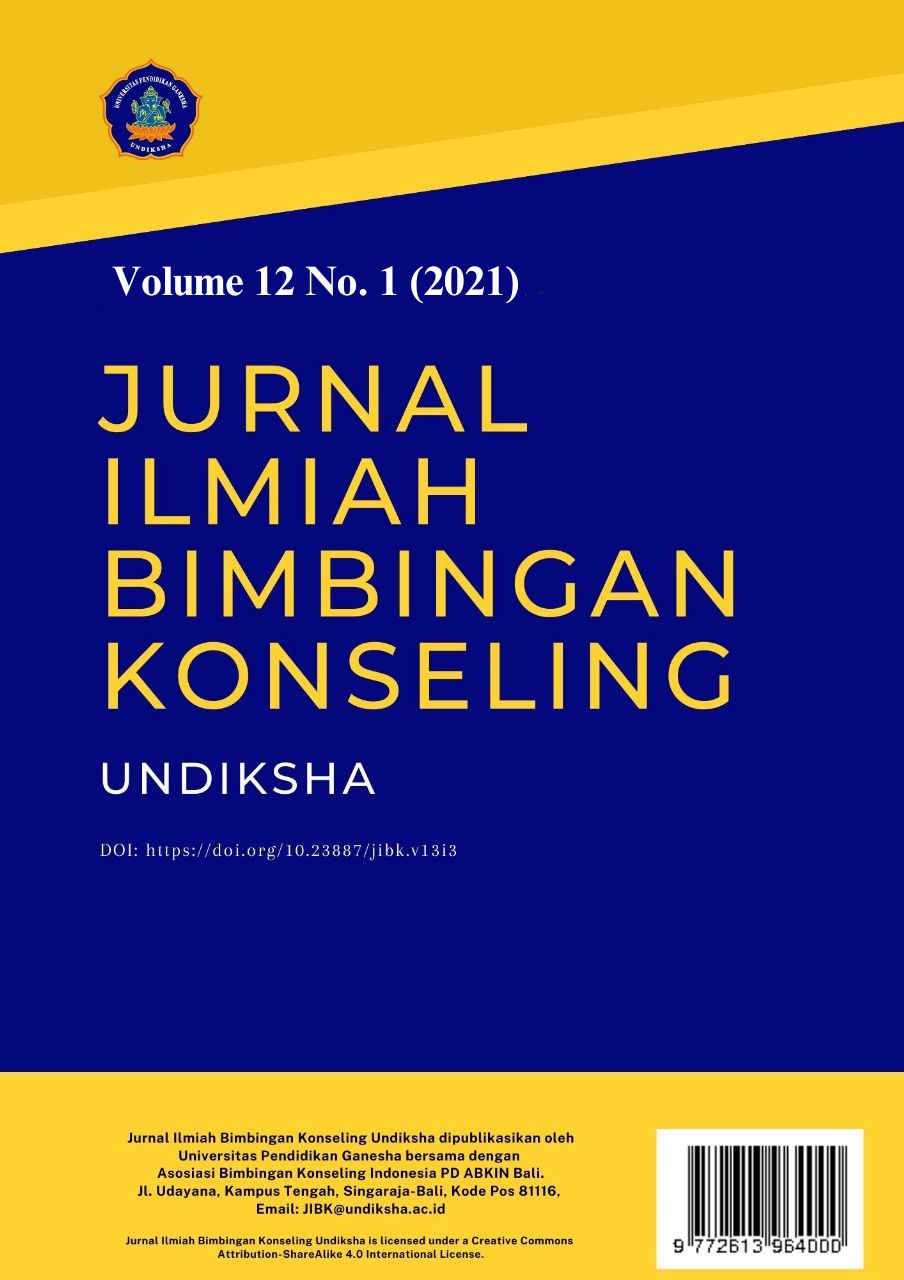Pelatihan Regulasi Emosi Untuk Meningkatkan Subjective Well-Being Pada Penyandang Tunarungu di Kota Binjai
DOI:
https://doi.org/10.23887/jjbk.v12i1.32009Keywords:
pelatihan regulasi emosi, subjective well-being, tunarungu.Abstract
Abstract: The study aims to determine the influence of emotional regulatory training to improve subjective well-being. The subjects used in this study were deaf people in the city of Binjai and 10 people. The method used in this research is an experimental method with the model one group pretest-posttest. The hypothesis in this study states that there is a difference in subjective well-being in deaf people before and after emotional regulatory training. Subjective well-being in deaf people will increase after training is given. Data analysis result using paired samples t-test obtained the value of correlation (r) between before training and after training is 0.796 with significant 0.006 and t = -4.553 with a significant p = 0.001 < 0.05 which indicates that there is a difference between the subjective well-being before and after emotional regulation training which means the hypothesis is acceptable. The conclusion is that emotional regulation training gives an influence in improving the subjective well-being of deaf people in the city of Binjai.
Indonesian Abstract. Penelitian ini bertujuan untuk mengetahui pengaruh pelatihan pengaturan emosional untuk meningkatkan kesejahteraan subjektif. Subjek yang digunakan dalam penelitian ini adalah penyandang tuna rungu di Kota Binjai dan 10 orang. Metode yang digunakan dalam penelitian ini adalah metode eksperimen dengan model one group pretest-post test. Hipotesis dalam penelitian ini menyatakan bahwa terdapat perbedaan kesejahteraan subjektif pada penyandang tunarungu sebelum dan sesudah pelatihan pengaturan emosi. Kesejahteraan subjektif pada penyandang tunarungu akan meningkat setelah diberikan pelatihan. Hasil analisis data menggunakan uji-t berpasangan diperoleh nilai korelasi (r) antara sebelum pelatihan dan setelah pelatihan adalah 0,796 dengan signifikan 0,006 dan t = -4,553 dengan signifikan p = 0,001 <0,05 yang menunjukkan bahwa ada perbedaan antara subyektif. kesejahteraan sebelum dan sesudah pelatihan regulasi emosional yang berarti hipotesis dapat diterima. Kesimpulannya adalah bahwa pelatihan regulasi emosional memberikan pengaruh dalam peningkatan kesejahteraan subjektif pada penyandang tuna rungu di Kota Binjai.
References
Aminzadeh, D. M., Asmari,Y., Karimil, S., Hosiensabet, F. & Sharifi, M. (2018). Improvement of subjective well-being in students with physical disability: mental rehabilitation based on teaching emotion regulation skills. Jurnal of Practice in Clinical Psychology, 6(1), 39-46. DOI: https://doi.org/10.29252/nirp.jpcp.6.1.39
https://www.researchgate.net/publication/322748499
Azwar, S. (2012).Penyusunan skala psikologi. Yogyakarta: Pustaka Pelajar.
Aesijah, S., Prihartanti, N. & Pratisti, W. D. (2016).Pengaruh pelatihan regulasi emosi terhadap kebahagiaan remaja panti asuhan yatim piatu.Jurnal Indigenous, 1(1), 39-47. https://docplayer.info/135446158 DOI: https://doi.org/10.23917/indigenous.v1i1.1792
Birditt, K. S., Polenick, C. A., Luong, G., Charles, S. T. & Fingerman, K. L. (2019). Daily interpersonal tensions and well-being among older adults: the role of emotion regulation strategies. Journal Psychology and Aging, 8(7), 1-13.
https://www.researchgate.net/publication/336930375
Brebahama, A. & Listyandini, A. R. (2016).Gambaran tingkat kesejahteraan psikologis penyandang tunanetra dewasa muda. Jurnal Mediapsi, 2(1), 1-10. DOI: https://doi.org/10.21776/ub.mps.2016.002.01.1
https://mediapsi.ub.ac.id/index.php/mediapsi/article/view/8
Desiningrum, D. R. (2016).Psikologi anak berkebutuhan khusus.Yogyakarta: Psikosain.
Festi, P. (2018). Buku ajar lansia :Lanjut usia, perspektif, dan masalah. Surabaya: UMSurabaya.
Gross, J. J. (2007). Handbook of emotion regulation. New York: The Guilford Press.
Indrijati, H. (2016). Psikologi perkembangan dan pendidikan anak usia dini. Jakarta: Kencana.
Izzaty, R. E. (2013). Perilaku anak prasekolah.Jakarta: Gramedia.
Katana, M., Röcke, C., Spain, S. M. & Allemand, M. (2019).Emotion regulation, subjective well-being, and perceived stress in daily life of geriatric nurses.Jurnal Frontiers in Psychology, 10(1 ), 1-11. DOI: https://doi.org/10.3389/fpsyg.2019.01097
https://www.ncbi.nlm.nih.gov/pmc/articles/PMC6529805/
Kisah Hidup Saya Melihat, Tapi Tidak Dapat Mengerti. (2019). Diambil kembali dari JW.Org: https://www.jw.org/id/perpustakaan/majalah/wp20130301/melihat-tapi-tidak-mengerti/.
Nurlaela, S. (2017).Pengaruh pelatihan regulasi emosi untuk meningkatkan subjective well-being pada orangtua dengan anak berkebutuhan khusus (ABK).Jurnal Bimbingan dan Konseling, 5(2),109-116. DOI: https://doi.org/10.12928/psikopedagogia.v5i2.7112
http://journal.uad.ac.id/index.php
Maddux, J. E. (2018). Subjective well-being and life satisfaction.New York: Routledge. DOI: https://doi.org/10.4324/9781351231879
Mauludi, S. (2017).Happiness here.Jakarta: Gramedia.
Mirza, R. & Sulistyaningsih, W. (2013).Cognitive behavioral therapy untuk meningkatkan regulasi emosi pada anak korban konflik aceh.Jurnal Psikologia, 8(2), 59-72.
https://doi.org/10.32734/psikologia.v8i2.2773 DOI: https://doi.org/10.32734/psikologia.v8i2.2773
Nejad, Y. A., Sabet, H. & Borjali (2017).Effectiveness of emotion regulation training on increasing self-efficacy and well-being in drug-dependent individuals.Journal of Clinical Psychology, 6(1), 9-16. DOI: https://doi.org/10.18869/acadpub.johe.6.1.9
https://www.researchgate.net/publication/320563479
Payadnya, A. & Jayantika, T. A. (2018).Panduan penelitian eksperimen beserta analisis statistik dengan SPSS. Yogyakarta: Deepublish.
Putri, D. W. L., Uyun, Q. & Sulistyarini, I. (2017). Pelatihan regulasi emosi untuk meningkatkan kesejahteraan subjektif orang dengan hipertensi esensial.Journal of Psychology Philantrophy, 1(1), 1-75.
http://dx.doi.org/10.26623/philanthropy.v1i1.675 DOI: https://doi.org/10.26623/philanthropy.v1i1.675
Santrock, J. W. (2010). Child development. New York: Mike Sugarman.
Seniati, T., Yulianto, A. & Setiadi, B. N. (2011).Psikologi eksperimen.Jakarta: PT Indeks.
Siyoto, S. & Sodik, A. M. (2015).Dasar metodologi penelitian. Yogyakarta: Literasi Media Publishing.
Santoso, S. (2010).Statistik multivariat: Konsep dan aplikasi dengan SPSS. Jakarta: PT Elex Media Komputindo.
Soetjiningsih, H. C. (2012). Psikologi perkembangan anak: Sejak pembuatan sampai dengan kanak-kanak akhir. Jakarta: Kencana.
Yadav, E. & Chanana, S. (2018). Emotional regulation and well-being among elderly.Journal of Scientific and Research Publications, 8(2), 196-200.
http://www.ijsrp.org/research-paper-0218/ijsrp-p7422
Yuliawati, L., Christy, M. L., Layliya, N., Thenarianto, J. J. & Salim, R. I. (2019).Pertolongan pertama pada waktu kuantitatif (P3K): Panduan praktis menggunakan software JASP. Surabaya: Universitas Ciputra.
Downloads
Published
Issue
Section
License
Jurnal Ilmiah Bimbingan Konseling Undiksha is an Open Access Journal. The authors who publish the manuscript in this journal agree to the following terms:
JIBK is licensed under a Creative Commons Attribution 4.0 International License. This permits anyone to copy, redistribute, remix, transmit and adapt the work provided the original work and source is appropriately cited.
This means:
Jurnal Ilmiah Bimbingan Konseling is licensed under a Creative Commons Attribution 4.0 International License.
(1) Under the CC-BY license, authors retain ownership of the copyright for their article, but authors grant others permission to use the content of publications in JIBK in whole or in part provided that the original work is properly cited. Users (redistributors) of JIBK are required to cite the original source, including the author's names, JIBK as the initial source of publication, year of publication, volume number, issue, and Digital Object Identifier (DOI); (2) The authors are the copyright owner of the article, and the author grants the JIBK held the first publication right.









.png)

.jpg)
